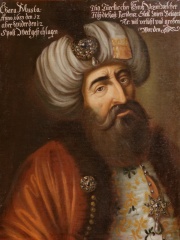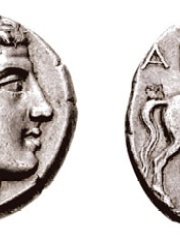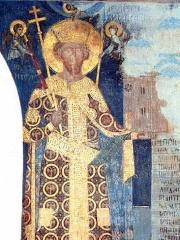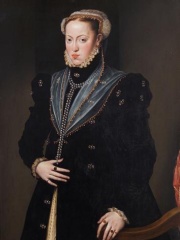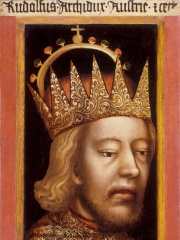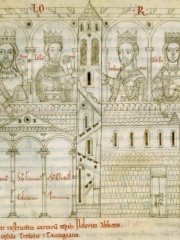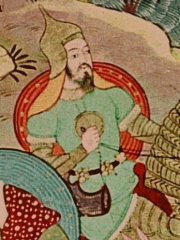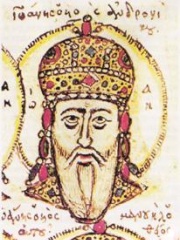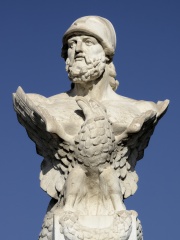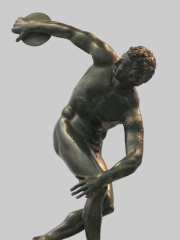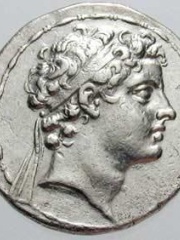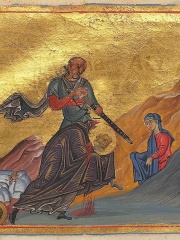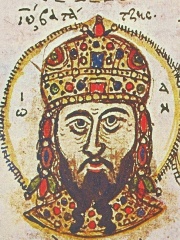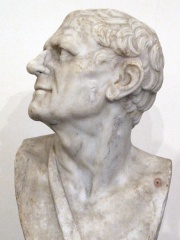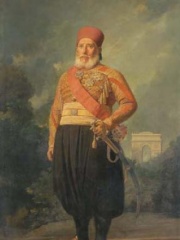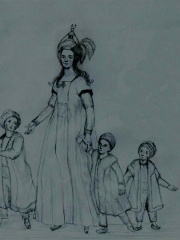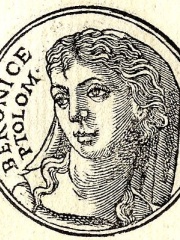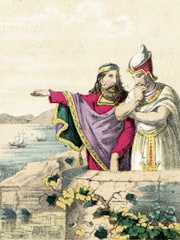Polityk
Admetus
PL.WIKIPEDIA PAGE VIEWS (PV)

 Admetus
Admetus
Jego biografia jest dostępna w 46 różnych językach w Wikipedii (wzrost z 45 w 2024 roku). Admetus jest 1455. najpopularniejszym polityk (wzrost z 2696. w 2024 roku), 106. najpopularniejszą biografią Grecja (wzrost z 182. w 2019 roku) oraz 36. najpopularniejszym polityk Grecja.
Memorability Metrics
Page views of Admetus by language
Among Polityks
Among polityks, Admetus ranks 1,455 out of 19,576. Before him are Kara Mustafa Pasha, Archelaus I of Macedon, Stefan Lazarević, Dolores Ibárruri, Hassan Nasrallah, and Archduchess Elisabeth Marie of Austria. After him are Maria of Austria, Holy Roman Empress, Rudolf IV, Duke of Austria, Václav Klaus, Lambert of Italy, Ariq Böke, and Yeonsangun of Joseon.
Most Popular Polityks in Wikipedia
Go to all RankingsKara Mustafa Pasha
1634 - 1683
HPI: 74.01
Rank: 1,449
Archelaus I of Macedon
490 BC - 399 BC
HPI: 74.01
Rank: 1,450
Stefan Lazarević
1374 - 1427
HPI: 74.00
Rank: 1,451
Dolores Ibárruri
1895 - 1989
HPI: 74.00
Rank: 1,452
Hassan Nasrallah
1960 - 2024
HPI: 74.00
Rank: 1,453
Archduchess Elisabeth Marie of Austria
1883 - 1963
HPI: 73.99
Rank: 1,454
Admetus
HPI: 73.99
Rank: 1,455
Maria of Austria, Holy Roman Empress
1528 - 1603
HPI: 73.99
Rank: 1,456
Rudolf IV, Duke of Austria
1339 - 1365
HPI: 73.98
Rank: 1,457
Václav Klaus
1941 - Present
HPI: 73.98
Rank: 1,458
Lambert of Italy
880 - 898
HPI: 73.98
Rank: 1,459
Ariq Böke
1219 - 1266
HPI: 73.98
Rank: 1,460
Yeonsangun of Joseon
1476 - 1506
HPI: 73.97
Rank: 1,461
In Grecja
Among people born in Grecja, Admetus ranks 106 out of NaN. Before him are Diotima of Mantinea (-450), John V Palaiologos (1332), Cimon (-510), Myron (-500), Theo Angelopoulos (1935), and Antiochus V Eupator (-173). After him are Dionysius the Areopagite (100), Aristides (-550), Agrippina the Elder (-14), Eleftherios Venizelos (1864), Melina Mercouri (1920), and Pheidippides (-600).
Others born in Grecja
Go to all RankingsDiotima of Mantinea
PHILOSOPHER
450 BC - 300 BC
HPI: 74.23
Rank: 100
John V Palaiologos
POLITICIAN
1332 - 1391
HPI: 74.18
Rank: 101
Cimon
MILITARY PERSONNEL
510 BC - 450 BC
HPI: 74.15
Rank: 102
Myron
SCULPTOR
500 BC - 500 BC
HPI: 74.09
Rank: 103
Theo Angelopoulos
FILM DIRECTOR
1935 - 2012
HPI: 74.06
Rank: 104
Antiochus V Eupator
POLITICIAN
173 BC - 162 BC
HPI: 74.02
Rank: 105
Admetus
POLITICIAN
HPI: 73.99
Rank: 106
Dionysius the Areopagite
RELIGIOUS FIGURE
100 - 100
HPI: 73.94
Rank: 107
Aristides
POLITICIAN
550 BC - 467 BC
HPI: 73.93
Rank: 108
Agrippina the Elder
POLITICIAN
14 BC - 33
HPI: 73.84
Rank: 109
Eleftherios Venizelos
POLITICIAN
1864 - 1936
HPI: 73.83
Rank: 110
Melina Mercouri
ACTOR
1920 - 1994
HPI: 73.80
Rank: 111
Pheidippides
SOCIAL ACTIVIST
600 BC - 490 BC
HPI: 73.68
Rank: 112
Among Polityks In Grecja
Among polityks born in Grecja, Admetus ranks 36. Before him are Alexander of Greece (1893), John III Doukas Vatatzes (1192), Lysimachus (-361), Ibrahim Pasha of Egypt (1789), John V Palaiologos (1332), and Antiochus V Eupator (-173). After him are Aristides (-550), Agrippina the Elder (-14), Eleftherios Venizelos (1864), Mahfiruz Hatun (1590), Berenice I of Egypt (-340), and Polycrates (-600).
Alexander of Greece
1893 - 1920
HPI: 74.74
Rank: 30
John III Doukas Vatatzes
1192 - 1254
HPI: 74.69
Rank: 31
Lysimachus
361 BC - 281 BC
HPI: 74.64
Rank: 32
Ibrahim Pasha of Egypt
1789 - 1848
HPI: 74.26
Rank: 33
John V Palaiologos
1332 - 1391
HPI: 74.18
Rank: 34
Antiochus V Eupator
173 BC - 162 BC
HPI: 74.02
Rank: 35
Admetus
HPI: 73.99
Rank: 36
Aristides
550 BC - 467 BC
HPI: 73.93
Rank: 37
Agrippina the Elder
14 BC - 33
HPI: 73.84
Rank: 38
Eleftherios Venizelos
1864 - 1936
HPI: 73.83
Rank: 39
Mahfiruz Hatun
1590 - 1620
HPI: 73.55
Rank: 40
Berenice I of Egypt
340 BC - 268 BC
HPI: 73.40
Rank: 41
Polycrates
600 BC - 515 BC
HPI: 73.36
Rank: 42
